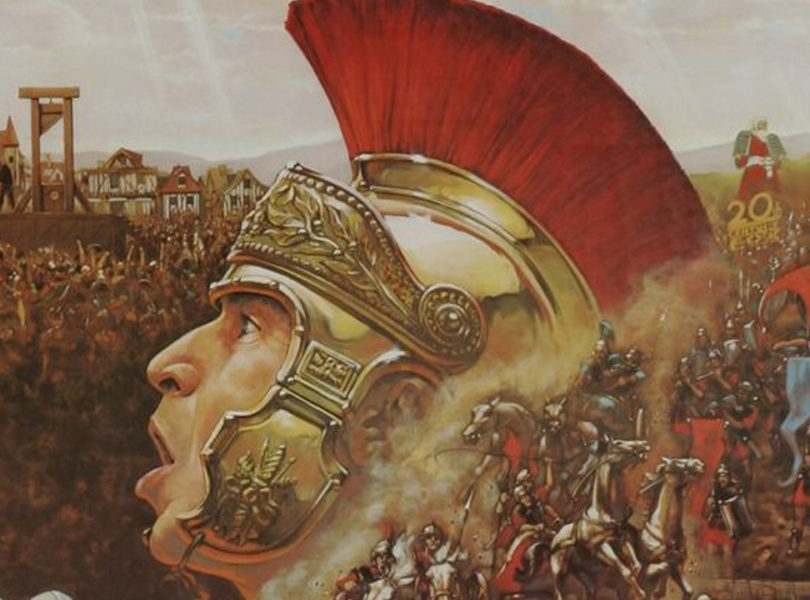Release Date: June 12, 1981
Director: Mel Brooks
Starring: Mel Brooks, Gregory Hines, Dom DeLuise, Madeline Kahn, Harvey Korman, Cloris Leachman, Ron Carey, Pamela Stephenson, Shecky Greene, Sid Caesar, Orson Wells
Favorite quote: “Oh, sieze this, Honkus!”– Josephus
From the moment I was allowed to watch “naughty” movies to now, there has been one constant. Well, two constants, but I think my fascination with breasts is more gender-specific and was around well before I realized it. The one true constant during that time has been Mel Brooks. Although his career began well before I was a funny-looking tadpole in my daddy’s loins, the man’s filmography has been a source of never-ending entertainment.
When I started the Have You Seen series, I knew I would highlight at least one of his films. Until Sunday, I was set to write about my absolute favorite movie of his: Blazing Saddles. In my opinion, he has not written, directed, or produced a finer comedy than the blue-as-a-Smurf title set in the Old West.
A funny thing happened, though. I thought back to the first Mel Brooks movie I ever saw. It wasn’t Blazing Saddles. In fact, it’s a movie I love but hear or read very little about. It’s his 1981 take on world history: History of the World Part 1.
The fact that this movie isn’t as acclaimed as his more iconic titles – Blazing Saddles, Spaceballs, The Producers, Young Frankenstein – isn’t all that surprising. I mean, look at those titles. Those are brilliant movies! History of the World Part 1 may not be brilliant, but what it lacks for in brilliance it makes up in pure humor.
(As an aside, I decided to rate his movies on my own scale. History of the World Part 1 ranked 6th on that list. I love this movie, and it only managed to rank 6th on my list. Those other five movies are absolute comedic gold!)
The movie is not a single story. Rather, it’s a collection of vignettes that take place in different eras of human history. The movie explores – and lampoons – the Stone Age, the Old Testament, the Roman Empire, the Spanish Inquisition, and the French Revolution. Each has its own theme and its own actors (only Mel Brooks himself assumes multiple roles), and each is absolutely hilarious! The narration by Orson Wells gives each vignette the extra gravity that belies all the nonsense that follows.
Each theme is played out differently. While the Old Testament portion is short, consisting of how Moses came down from the mountain to deliver God’s Commandments (hint: there were 15, but Moses dropped a tablet), The French Revolution is one of the longer set-pieces. And while the Roman Empire is more a stand-up comedy bit, the Spanish Inquisition is a full-bore musical number. All skits, however, contain the biting humor that Mel Brooks is known for.
The guest appearances are really the biggest treat. The Roman Empire features a dance skit – and a bunch of awesome one-liners – from Josephus (Gregory Hines), an uproarious appearance by Emperor Nero (Dom Deluise), and a great number by Empress Nympho (Madeline Kahn) where she rates participants for an upcoming orgy. Anyone who knows the late Kahn’s penchant for singing for laughs will love this part!
The comedy in History of the World Part 1 is not as daring and taboo as Blazing Saddles, but it’s still funny as shit. By 1981, it seems Brooks was not looking to shock the audience and was more content with making them laugh uproariously. It’s a formula he would fine tune later with Robin Hood: Men in Tights and Spaceballs. It’s fair to say that this movie was the screen test for the gags he would pull later on.
Whenever I watch History of the World Part 1, I revel in the familiar goofs I’ve seen about a thousand times but never get tired of. When I talk about the movie to family and friends, It’s always more referential than anything. “How about the eunuchs’ scene?” “I lose it every time King Louis XV says, ‘It’s good to be the king!’” “I never get tired of hearing Harvey Korman saying, “Count…Dee Monay!”
For those who remember the bits, those quoted made you smile. If you’ve never seen the movie, you need to remedy that immediately. It may not be the most well-known of Mel Brooks’ work, but it is still a classic in its own right.


